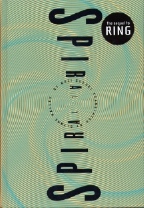Spiral
Koji Suzuki
Translated by Glynne Walley
Vertical-Inc
US Hardcover First
ISBN 1-932-23406-3
Publication Date: 05-01-2004
281 Pages; $24.95
Date Reviewed: 07-31-04
Reviewed by: Rick Kleffel © 2004

REFERENCES
COLUMNS
|
|
|
SpiralKoji SuzukiTranslated by Glynne WalleyVertical-IncUS Hardcover FirstISBN 1-932-23406-3Publication Date: 05-01-2004281 Pages; $24.95Date Reviewed: 07-31-04Reviewed by: Rick Kleffel © 2004 |
|
|
REFERENCES |
COLUMNS |
Having read 'Ring', the first novel is a series from Japanese writer Koji Suzuki, readers may think themselves prepared for the sequel. As you start the book, glance upward. The small black square in the sky above is the bottom of an Acme anvil. Don't even bother to step aside. The physics of the reading universe suggest you'll not be able to avoid it. 'Spiral' takes up shortly after the end of 'Ring' and audacious doesn't get you halfway past page one. Suzuki isn't just selling scares in 'Spiral'. He's swinging a baseball bat to your genre fiction sensibilities on multiple levels. When you expect horror, you get mystery. When you expect mystery, you get science fiction. By the time you think you're reading science fiction, you'll be able to read the lettering on the bottom of the anvil: 40 TONS.
Ando, the protagonist of 'Spiral', starts the novel as a man in mourning, a coroner who tries to lose himself in his work so that he does not have to think about the accidental drowning death of his son, and his subsequent divorce. He's even thankful when presented with the body of a colleague, Ryuchi, whom readers will recall as the grating scholar who missed the seven-day deadline in 'Ring'. He finds himself attracted to Ryuchi's lover, Mai, who found the body. But even on the slab, Ryuchi apparently has something to say. As Ando sews up the man, having stuffed him with newspaper, by chance, a small square of newsprint slides out as the final seam is stitched. On it are six numbers in two rows; 178 and 136.
From that instant, Suzuki begins an upward climb that takes Ando and the novel from ciphers and word puzzles into one unexpected consequence after another. While 'Ring' merely suggested the viral nature of the video taped curse, 'Spiral' takes mind-bogglingly confident strides from a puzzle-oriented mystery to a medical thriller and then sprints easily into the realm of science fiction. Make no mistake, Suzuki delivers one shock after another, and many of them will leave the reader ringing with horror. Even though the main character is a coroner, the shocks are not corporeal but conceptual. 'Spiral' will make you think thoughts you would not ever have considered could enter your brain.
In order to manage this, Suzuki keeps his prose bone-dry and his presentation straightforward, at times too straightforward. He brings the narrative to a dead halt with a brief explanation of how DNA works, which is admittedly mitigated by charts and diagrams, not the usual stuff of horror thrillers. He recaps most of the plot of 'Ring'. The former will have some readers turning the pages faster than they can possibly read, while the latter will be more welcome than it has any right to be. But Suzuki's crystal-clear concision is without peer when it comes to maintaining credibility in the face of plot escalations that hit precisely the right note of awe-inspiring intellectual astonishment. Like a cattle executioner in a slaughterhouse, Suzuki knows just where and how to apply his stun-gun revelations.
Suzuki's characters, as the subjects and objects of those revelations, manage to retain more autonomy than one might expect. Ando's grief is nicely established at the outset, with enough pertinent detail to display the depth of character required to sustain Suzuki's more outrageous innovations. Miyashita, his collaborator as he pursues the mystery of Ryuchi's death, offers a more balanced and human perspective on matters. One of the interesting aspects of reading a novel that in some senses conforms to the description of "suburban horror" is that the Japanese setting and culture come to life in subtle ways, in observations that might be overlooked in an American novel.
Walley's translation engine clunks once or twice, but it's otherwise as transparent as the Chip Kidd's psyche-out cover design. Vertical's usually fine design sensibilities are marred by paperback-style advertisements for coming works at the back of the book. As happy as readers will be to know that the final novel in the trilogy 'Loop', is coming next year, along with 'Dark Water', a collection of short stories this fall, the adverts actually start on the back of the final page of the novel itself. You need not be fussy to find this a bit gauche. I'll admit to being fussy.
Perhaps Vertical was betting on the fact that by the time readers have finished the novel, they're so thoroughly gobsmacked by what Suzuki brings to pass, they won't be able to focus on anything in the real world, even the novel that displaces it. Suzuki is nothing if not bold. 'Spiral' is the vector for a series of nasty concepts that wheedle their way into the reader's mindset with the help of his antiseptic prose and razor-blade reasoning. Suzuki cuts to the quick. His devil's-advocate logic is contagious. By the time you realize you're convinced, it's too late to look up. The last words you read aren't in the novel. 40 TONS.